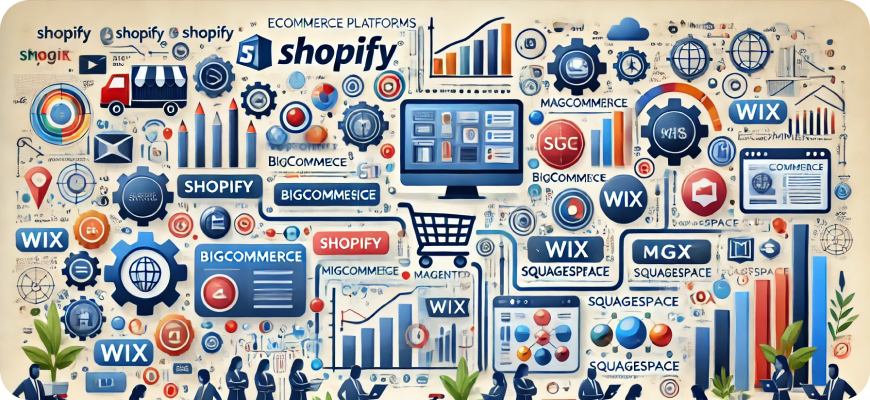Top eCommerce Platforms: WooCommerce Alternatives
For many eCommerce entrepreneurs, WooCommerce has been a popular choice due to its flexibility and seamless integration with WordPress. However, as businesses evolve and unique challenges arise, you may find yourself exploring alternatives that offer specific features, scalability, or ease of use that better align with your goals. The good news is that the eCommerce market offers a wide range of platforms tailored to different needs and business models. Here’s a comprehensive look at the top WooCommerce alternatives, including their strengths, weaknesses, and the scenarios they best fit.

1. Shopify
Overview: Shopify is one of the world’s most popular eCommerce platforms, known for its ease of use and versatility. It’s a fully hosted solution, meaning you won’t have to worry about managing server maintenance or security.
Pros:
- User-Friendly Interface: Shopify offers a straightforward setup process and intuitive dashboard, making it easy for beginners to create and manage their stores.
- Wide Range of Apps: With a vast app store, Shopify allows you to integrate various tools for marketing, customer service, inventory management, and more.
- Scalability: Shopify is suitable for small businesses and large enterprises alike, offering solutions like Shopify Plus for high-volume businesses.
- Mobile Optimization: All Shopify themes are mobile-responsive, providing a great shopping experience across devices.
Cons:
- Transaction Fees: Unless you use Shopify Payments, transaction fees are imposed on sales, which can eat into profits.
- Limited Customization: While Shopify themes are visually appealing, advanced customizations may require coding expertise or developer assistance.
- Costs Can Add Up: Subscription fees, app add-ons, and transaction fees can lead to higher costs as your business grows.
Ideal for: Small to medium-sized businesses looking for a user-friendly platform that scales with growth.
2. BigCommerce
Overview: BigCommerce is a robust eCommerce solution designed to help businesses grow. It offers a range of built-in features, making it a great alternative for those who need an all-in-one solution.
Pros:
- Built-In Features: BigCommerce comes with numerous built-in features, such as SEO tools, discounting systems, and multi-currency support, reducing the need for third-party apps.
- No Transaction Fees: Unlike many platforms, BigCommerce does not charge transaction fees, regardless of the payment gateway you use.
- Scalability: BigCommerce is known for its ability to handle large product catalogs and high traffic volumes without compromising on performance.
- B2B Features: It offers advanced features for B2B businesses, such as custom pricing, customer groups, and bulk pricing.
Cons:
- Learning Curve: While feature-rich, BigCommerce’s extensive toolset may be overwhelming for beginners.
- Revenue-Based Pricing: BigCommerce’s pricing structure scales with your revenue, potentially leading to higher costs as you grow.
- Limited Themes: Compared to Shopify, BigCommerce has a smaller selection of themes.
Ideal for: Growing businesses that need a feature-rich platform with built-in functionality to support large catalogs or B2B sales.
3. Magento (Adobe Commerce)
Overview: Magento, now known as Adobe Commerce, is an open-source platform known for its flexibility and scalability. It’s ideal for enterprises and developers who need full control over their store’s design and functionality.
Pros:
- Highly Customizable: With access to the source code, you can customize virtually every aspect of your store.
- Powerful Features: Magento offers advanced features, including multi-store capabilities, robust inventory management, and extensive SEO tools.
- Large Community: Magento has a strong developer community, offering support, extensions, and customizations.
- Scalability: It can handle large catalogs, high traffic, and complex operations.
Cons:
- Complex Setup: Magento’s powerful features come with a steep learning curve, often requiring experienced developers.
- Resource Intensive: Running a Magento store can be resource-intensive, potentially requiring dedicated hosting for optimal performance.
- Costly for Enterprises: While Magento Open Source is free, the enterprise version (Adobe Commerce) can be expensive.
Ideal for: Large businesses and enterprises looking for a customizable, scalable solution with complex requirements.
4. Squarespace
Overview: Squarespace is a website builder with integrated eCommerce functionality. It is known for its visually appealing templates and ease of use.
Pros:
- Beautiful Designs: Squarespace offers high-quality, professional templates that are ideal for showcasing products.
- All-in-One Solution: Hosting, domains, and SSL certificates are included, making it easy to manage your site from one place.
- Simple Setup: The drag-and-drop editor is intuitive, making it accessible for non-tech-savvy users.
- Content Management: Squarespace excels at combining content (like blogs) and eCommerce, making it ideal for content-driven stores.
Cons:
- Limited eCommerce Features: Squarespace lacks some of the advanced features found on platforms like Shopify or Magento, such as complex inventory management.
- Transaction Fees: Unless you’re on a higher-tier plan, Squarespace charges transaction fees on sales.
- Less Customization: Customizing the backend and adding unique features can be challenging.
Ideal for: Small businesses, artists, or entrepreneurs who prioritize design and content alongside eCommerce functionality.
5. Wix
Overview: Wix is a website builder that offers eCommerce capabilities, making it an easy-to-use option for small businesses.
Pros:
- Ease of Use: Wix’s drag-and-drop editor is one of the most user-friendly on the market.
- Flexible Design: It offers a wide range of customizable templates, enabling users to create unique store designs.
- Built-In Tools: Wix includes marketing and SEO tools to help you promote your store.
- Affordability: Pricing plans are competitive, making it an affordable option for small businesses.
Cons:
- Scalability Limitations: Wix’s eCommerce functionality may not be sufficient for large-scale operations.
- Customization Constraints: While flexible, Wix doesn’t offer the deep customization capabilities of platforms like Magento.
- App Ecosystem: Wix’s app market is smaller than Shopify’s, which may limit integrations.
Ideal for: Small businesses and entrepreneurs looking for an affordable, easy-to-use platform with flexible design options.
6. PrestaShop
Overview: PrestaShop is an open-source eCommerce platform that allows for customization and flexibility.
Pros:
- Free to Use: PrestaShop is open-source, meaning you can use the core software for free.
- Customizable: Access to the source code allows for deep customization to fit specific business needs.
- Large Module Library: PrestaShop offers a variety of add-ons and modules for extending functionality.
- Internationalization: It supports multiple languages and currencies, making it ideal for global stores.
Cons:
- Technical Skills Required: Customization often requires coding skills or developer assistance.
- Limited Customer Support: Unlike hosted solutions, there’s no dedicated support unless you pay for PrestaShop’s support plan.
- Complexity: Managing modules and updates can be cumbersome.
Ideal for: Small to medium-sized businesses that need a customizable, international-friendly platform.
7. OpenCart
Overview: OpenCart is a lightweight, open-source eCommerce platform that offers a balance of simplicity and flexibility.
Pros:
- Low Cost: OpenCart is free to download and use, with affordable add-ons available.
- User-Friendly Admin Panel: The dashboard is intuitive, making it easy to manage your store.
- Extensions and Add-Ons: There is a large library of extensions available to enhance functionality.
- Multi-Store Management: OpenCart allows you to manage multiple stores from one dashboard.
Cons:
- Limited Built-In Features: Some advanced eCommerce features require extensions.
- Customization Limitations: Customizations may require developer assistance, especially for complex needs.
- Performance: Large stores may experience slower performance compared to other platforms.
Ideal for: Businesses looking for a lightweight, cost-effective, and customizable solution.
8. Volusion
Overview: Volusion is a hosted eCommerce solution designed for small to medium-sized businesses.
Pros:
- Easy Store Setup: Volusion offers a simple setup process with built-in features for inventory management and payments.
- No Transaction Fees: Unlike some platforms, Volusion doesn’t charge transaction fees.
- Customer Support: Volusion offers reliable customer support for users.
Cons:
- Limited Design Options: Volusion’s templates are somewhat limited compared to competitors like Shopify and Wix.
- Complexity for Advanced Features: Customizing beyond basic options can be challenging.
- Outdated User Interface: Some users find the dashboard and tools less modern than other platforms.
Ideal for: Small to medium-sized businesses looking for an all-in-one solution without transaction fees.
Comparison Table
| Platform | Ideal For | Pros | Cons |
|---|---|---|---|
| Shopify | Small to large businesses | User-friendly, scalable, large app ecosystem | Transaction fees, costs can add up |
| BigCommerce | Growing businesses, B2B | Built-in features, no transaction fees, scalability | Steeper learning curve, revenue-based pricing |
| Magento | Large enterprises | Customizable, powerful features, scalability | Complex setup, resource-intensive |
| Squarespace | Small businesses, artists | Beautiful designs, all-in-one solution | Limited eCommerce features, transaction fees |
| Wix | Small businesses | Easy to use, flexible design, affordable | Limited scalability, smaller app ecosystem |
| PrestaShop | Customizable small/medium stores | Free, customizable, large module library | Technical skills required, limited support |
| OpenCart | Cost-effective, lightweight stores | Low cost, multi-store management, user-friendly | Limited built-in features, potential performance issues |
| Volusion | Small/medium businesses | Easy setup, no transaction fees | Limited design options, less modern interface |

Conclusion
The right WooCommerce alternative depends on your business goals, technical expertise, and budget. Shopify and BigCommerce excel in scalability and ease of use, making them ideal for businesses focused on growth. Magento offers unparalleled customization for enterprises with complex needs, while platforms like Squarespace and Wix prioritize simplicity and design. Open-source options like PrestaShop and OpenCart provide flexibility but may require technical knowledge.
Evaluate your specific needs, growth trajectory, and operational preferences to find the best eCommerce platform that aligns with your goals. Each option offers unique benefits and potential challenges, so choose wisely to set your online business on a path to success.






